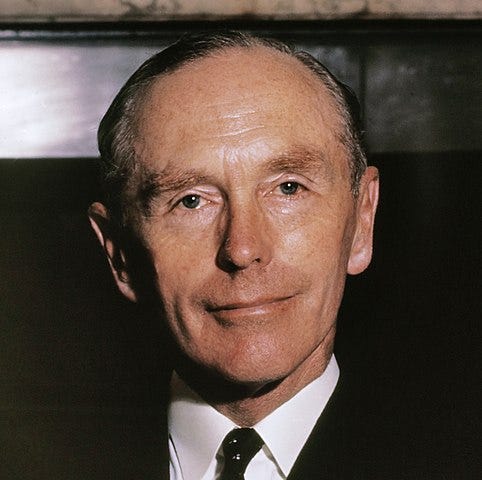The last to emerge.
After the most dramatic conference in Tory history, the clock was ticking down on Harold Macmillan's resignation and the appointment of his successor. Few people expected what happened next (Part 2/2)
This is the second in a two-part series on the 1963 Conservative leadership selection. In part 1, Harold Macmillan announced that he would be resigning and a frenetic Conservative Party Conference took on the atmosphere of an American nominating convention. We pick up the story with ministers and journalists back in London and the consultations over who should be the next prime minister about to begin. You can read part 1 here.
The Earl of Home. By the end of this post, he would be Sir Alec Douglas-Home.
The last to emerge.
by Lee David Evans
Whilst the majority of his colleagues were away at Party Conference in Blackpool, prime minister Harold Macmillan, still confined to a hospital bed, drafted his proposals for the consultation over his successor. He suggested that the Cabinet be consulted by Lord Dilhorne, the Lord Chancellor; Conservative MPs by Martin Redmayne, the Chief Whip in the Commons; active Conservative peers by Lord St Aldwyn, the Chief Whip in the Lords; and the wider party grassroots by Lord Poole, the co-party chairman. (Iain Macleod, his fellow party chairman and an outside candidate for the highest office, was excluded.) The proposals were brilliantly devised to maximise Macmillan’s influence over the process. Whereas in 1957 the Cabinet was asked in turn to choose between Rab Butler and Macmillan, with the clear result reported to the Queen, Macmillan ensured that the 1963 consultation was sufficiently broad to make any clear, definitive outcome a near impossibility. Whilst seemingly more democratic, it enhanced Macmillan’s power as interpreter of the party’s will. Should the Queen ask for Macmillan’s advice on his successor - and it had been made clear by the Palace that she would - the content of that advice would be left to his discretion. In an astounding act of passivity, the Cabinet agreed to Macmillan’s plan.
With agreement over the process, events began to move quickly. Over two days consultees were typically asked three questions: (1) who should succeed Macmillan? (2) who should be the second choice? And (3) who among the contenders would you least like to see as leader? Dilhorne, a support of the Earl of Home, summarised that his man had the support of just over half of the Cabinet, with Reginald Maudling, Butler and Lord Hailsham splitting the remaining support between them. (Serious doubt has since been cast on Dilhorne’s figures, especially his record of Macleod supporting Home. Macleod was so opposed to Home’s succession that he refused to serve in government under him.) The peers were judged to be two-to-one in favour of Home. Among the party in the country, the best estimate was that 60 per cent were for Hailsham and 40 per cent for Butler - with Home’s willingness to serve not yet known to them.
Among MPs, whose confidence the new leader needed to command, Redmayne, himself a Home supporter, concluded that his candidate had a plurality of support. William Whitelaw, then a junior minister, was one of several to recall the unusual means by which he was consulted:
I was asked who I wanted as Leader. I replied Rab Butler. I was then asked what I thought at the time was rather an extraordinarily question - whether I would support Alec Douglas-Home if he was available. I replied that of course he would make an excellent Leader and Prime Minister…
Several MPs subsequently concluded that similar conversations were recorded as votes for Home. Guided in this way, the growing mood for Home at the top of the party found form in the preferences - sometimes offered freely, sometimes invited - of MPs.




